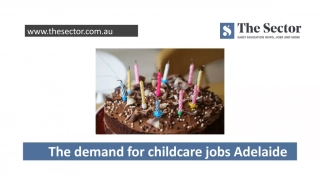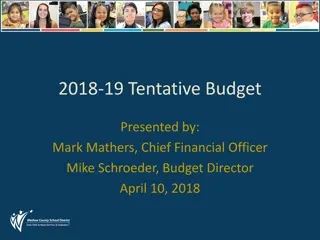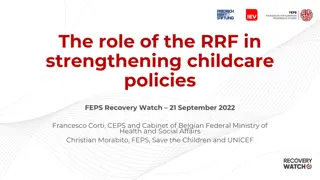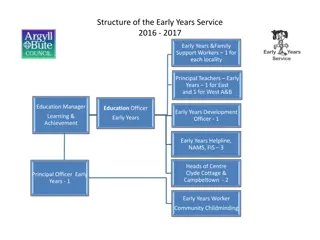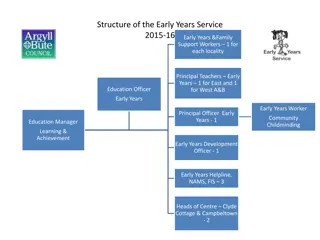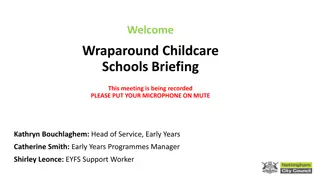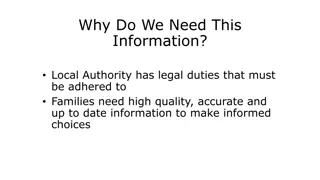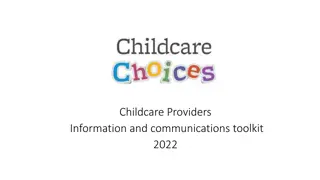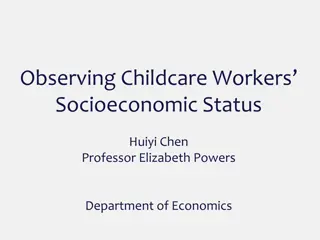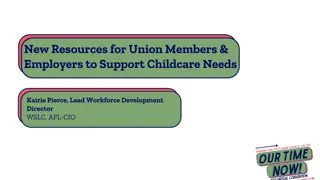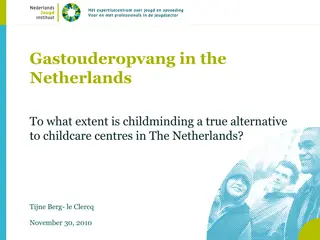Implications of Budget 2023 for Early Years and Childcare in England
The Budget 2023 introduces significant changes to early years and childcare in England, focusing on uplifting hourly funding rates, adjusting staff-to-child ratios, increasing choice and affordability for parents, and supporting working parents through various initiatives. These changes will be rolled out gradually from September 2023 to September 2026, aiming to enhance the accessibility and quality of childcare services. Specific reforms include increased free hours for working parents and the implementation of a wraparound childcare scheme. Impacts on Norfolk include the need to expand 2-year-old childcare places to accommodate the changes. The reforms aim to improve the overall childcare market and offer better support for parents and children.
Download Presentation

Please find below an Image/Link to download the presentation.
The content on the website is provided AS IS for your information and personal use only. It may not be sold, licensed, or shared on other websites without obtaining consent from the author. Download presentation by click this link. If you encounter any issues during the download, it is possible that the publisher has removed the file from their server.
E N D
Presentation Transcript
Budget 2023 What it means for Early Years and Childcare
Budget announcements Uplift the hourly funding rate paid to providers, to deliver the existing free hours offers in England. The government will provide 204 million in 2023-24, paid from September 2023, and 288 million in 2024-25 Change staff-to-child ratios from 1:4 to 1:5 for 2 year-olds in England, to align with Scotland and other countries. This change will come into force from September 2023, subject to parliamentary procedure Increase choice and affordability for parents, by increasing the number of childminders. The government will provide start-up grants for new childminders, including those who register with a childminder agency The government will launch a consultation on further measures to support reform of the childcare market to improve the childcare offer for parents. This will include exploring further flexibilities for providers; allowing childminders more choice over how they operate, and introducing a new, streamlined childminder specific Early Years Foundation Stage framework.
Support for working parents Launch a new wraparound childcare pathfinder scheme in order that all parents of primary-aged children in England can access care in school from 8am-6pm. 289 million in start-up funding will be provided to enable schools and local authorities to test options to increase the availability of wraparound childcare, national roll out over academic years 2024-25 and 2025-26 Support with upfront costs, rather than in arrears, for parents on Universal Credit who are moving into work or increasing their hours alongside increasing the Universal Credit childcare cost maximum amounts to 951 for 1 child and 1,630 for 2 children Increase in the amount of free childcare that working families can access. The government will fund 30 hours per week (if term time only) for working parents with children aged 9 months up to 3 years in England, where eligibility will match the existing 3 to 4 year-old 30 hours offer. April 2024 - 2 year-olds will be able to access 15 hours of free childcare per week. September 2024 extended to 9 month to 2 year-olds from. September 2025 extended to 30 free hours per week
Timeline September 2023 Increase in funding rates (amount not yet known - ) Change of staff-to-child ratios from 1:4 to 1:5 for 2 year-olds is implemented April 2024 15 hours for 2 year olds of working parents (current eligibility rules will apply) September 2024 15 hours for eligible children from 9 months Roll out of wraparound childcare pathfinder begins September 2025 30 hours for all eligible children from the age of 9 months September 2026 most schools offering 8-6 before and after school care
Implications for Norfolk From April 2024 we will need to potentially double the amount of 2 year old places for working families so they can access 15 hours. Some of these children may already be taking up a place but more places will be needed Although this is referred to as free childcare, if the same rules apply as currently there will still be consumable/meals/additional service charges for parents Parents may choose to use provision in more urban areas as it will be closer to work, this may have an impact on more rural provision and provision in areas of disadvantage where there are fewer working households Many providers have closed baby provision as it is more expensive to run. No incentive to set up provision until funding is available Ongoing recruitment issues mean there may not be enough staff to provide the extra places. No incentive to existing practitioners to remain in sector, no measures to help with current recruitment and retention crisis It is unclear how much additional funding Norfolk will receive for the existing entitlements Additional pressure on HMRC if current system is used (parents have to reconfirm approx. every 3 months) Additional pressures on SENIF funding, as need will be identified earlier, and more children will be attending provision New childminders will have more incentive to join an agency rather than register independently
Our queries. What will the new funding rates look like for Norfolk? What is the level of demand for 9 mth olds to 2 year olds likely to be? Will we have sufficient places to meet demand? Will the measures announced support the early years sector enough to prevent further closures? Will the current cohort of funded 2 year olds be pushed out of places by children with working parents. May have implications for learning outcomes of more disadvantaged children Will the proposed 1:5 ratio be reflected in the funding rate? If it is, it won t help providers who need or want to operate the 1:4 ratio Will DfE produce updated statutory guidance? Have providers got the space and environment to provide baby places? Will the inspection process ensure new provision is high quality? The current cycle is 6 years Unclear if PVI sector is included in plans for wraparound childcare Will the childcare pathfinder scheme support children with additional needs to attend? Will schools have the staff to deliver wraparound childcare? Will this extend in to holidays?



